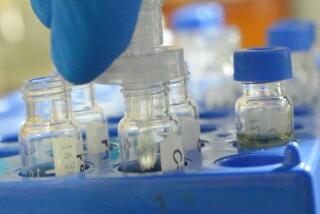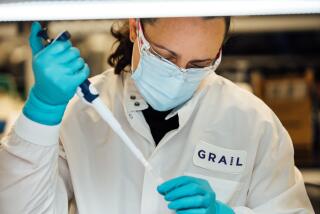Fullerton Lab Wrong on 19% of Pap Smears, Documents Say
- Share via
Fullerton-based National Cancer Screening Laboratories misdiagnosed about 19% of the Pap-smear specimens it handled and routinely failed to detect diseases including one case of “probable cancer” and 27 instances of precancerous cells, according to federal documents.
Because of the alleged misdiagnosed Pap smears, the Health Care Financing Administration has said it will decertify the company from participation in Medicare and Medi-Cal programs as of April 20.
“It is our opinion that services at National Cancer Screening Laboratory in Fullerton pose an immediate and serious threat to patient health and safety,” said Margaret Mandel, chief of HCFA’s standards and certification in a March 30 letter to the lab obtained under the Freedom of Information Act.
The Pap smear is a medical test widely used to detect cervical cancer. The American Cancer Society estimates that about 60,000 women contract the disease and nearly 7,000 die every year.
National Cancer owner Neil Gregory said that the reading of Pap smears is a highly subjective science and that doctors often disagree over results. “That is a matter of medical judgment,” he said of the agency’s audit.
Gregory closed National Cancer last week because the company was no longer profitable. The company processed about 100,000 Pap smears a year, according to federal and state officials. Meanwhile, Planned Parenthood--whose affiliates around the United States sent Pap smears to National Cancer--said Tuesday that it is in the process of notifying its 172 chapters about the federal government’s action.
“We will put out a general alert to our affiliates that this has happened and instructing them that our protocol requires that they notify all of the patients who they saw for Pap smears in the last 12 months and ask them to return for a repeat test,” said Planned Parenthood spokesman Douglas Gould.
The New York-based family planning organization said Tuesday that it could not immediately identify which chapters had contracted with National Cancer, but calls to the Los Angeles and Orange County chapters indicated that neither had ever done business with the company.
The affiliates “could be anywhere because the business is largely done through the mail,” Gould said.
The federal survey team which inspected National Cancer from March 13 to March 16 cited the company for numerous violations ranging from serious misdiagnoses to the company’s failure to maintain adequate patient records.
The survey team’s pathologist reviewed 331 Pap smear cases and found 64, or about 19%, either inaccurate or misleading. HCFA is requiring National Cancer to follow up on 63 of those.
Ten percent of the cases “were reported on smears which were considered totally unsatisfactory for proper evaluation,” the survey team said.
The industry average for Pap-smear errors is about 5%.
The federal government determined last year that Central Pathology Medical Services--formerly the nation’s largest Pap smear lab, based in Tarzana--had a 12% misdiagnosis rate. State inspectors subsequently said the figure was closer to 21%. Central Pathology was shut down by the state last April.
National Cancer’s technologists failed to detect the presence of at least one instance of what the survey team said was probable cancer. Tissue abnormalities and precancerous cells were also missed, the report said.
Gregory said that catching every error “is an absolute physical impossibility” unless the tests are rescreened at a much higher rate than the 10% currently required by law.
Among findings cited by the survey team was National Cancer’s use of coffee filters to remove specks from staining materials used to coat Pap-smear specimens.
Coffee filters, the report said, are not guaranteed to “retain microscopic particles and remove cellular elements from the stains,” and if particles remain in staining fluids the underlying specimen can be hard to read.
Particularly troubling to the survey team was a National Cancer practice for sealing a specimen onto a slide. Unlike most labs--which use a glass cover slip--National Cancer coated smears with an acrylic spray.
This method clouded the specimen with specks, thereby rendering some slides “totally unsatisfactory” for diagnosis, the report said. Diagnoses were made anyway, the report said.
The company’s record keeping was extremely poor, according to the survey team’s report.
Pap smears didn’t always contain identification of the patient or the doctor taking the specimen. Dates were often omitted. Personnel records such as employee resumes listing prior experience were missing.
Reports and slides from about 100,000 Pap smears taken during 1988 were unavailable to HCFA’s team of inspectors. “The laboratory stated that the slides were locked in an area off site and the key was lost,” the report said.
And the survey team said it could not find records to verify that the company was meeting the legal quality-control requirement of rescreening 10% of all Pap smears.
More to Read
Sign up for Essential California
The most important California stories and recommendations in your inbox every morning.
You may occasionally receive promotional content from the Los Angeles Times.










